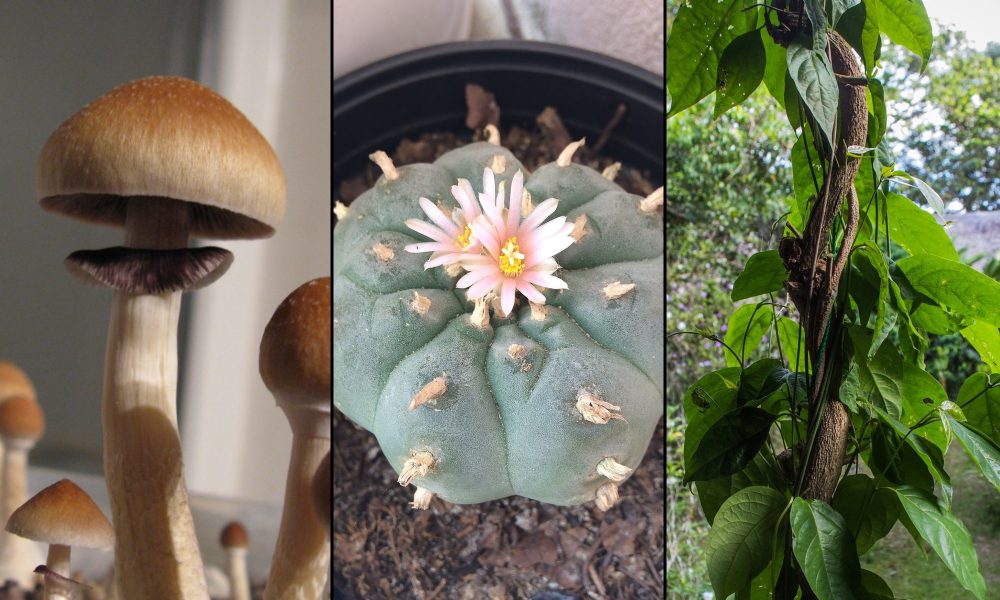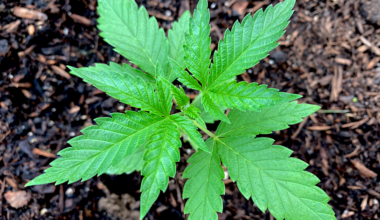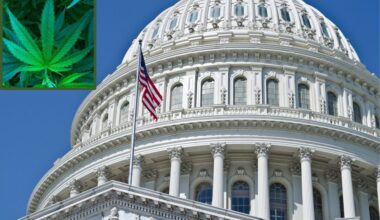Massachusetts activists are gearing up for a multi-pronged push to advance psychedelics reform locally and at the state level, with a campaign kicking off a signature drive last week to put a decriminalization measure on the ballot in the state’s second largest city.
The Bay Staters for National Medicine (BSNM) campaign launched its signature gathering effort to put the policy change before Worcester voters just days after the city’s Human Rights Commission approved a resolution urging the city manager to conduct a study on “the benefits of making arrests for growing and distributing entheogenic plants like psilocybin mushrooms among veterans and first-responders the lowest law enforcement priority of the Worcester Police Department.”
Separately, activists are deploying a strategy to have Massachusetts residents force state lawmakers to file legislation to both legalize entheogenic substances for therapeutic use and otherwise decriminalize certain psychedelics.
Both the Worcester initiative and the statewide legislation focus on psychedelics, but they would also broadly decriminalize low-level possession of all currently illicit drugs. Activists would like to see the Worcester City Council act on the proposal this year, but if not, they expect to have the roughly 16,000 signatures by summer 2023 for placement on that November’s ballot.
Psychedelics reform has moved quickly at the local level in jurisdictions throughout Massachusetts. If Worcester ultimately takes the step to decriminalize, it would be joining four other cities in the Bay State that have already enacted similar policy changes: Somerville, Cambridge, Easthampton and Northampton.
The text of the Worcester ballot initiative would make it so no government body in the city, including law enforcement, could use any funding to criminalize adults 18 and older for possessing or sharing up to five grams of any controlled substance (except “animal-derived bufotenine and animal-derived kambo”).
Then there’s specific language around certain psychedelic substances, including psilocybin, DMT, mescaline, MDMA and ibogaine. Local agencies couldn’t use funding to prosecute adults for possessing, cultivating or sharing up to 15 grams of those substances.
The measure seeks to further protect people against being criminalized for possessing or using “pipes, syringes, needles, or testing strips.”
Activists told Marijuana Moment that they will soon be pursuing a similar psychedelics reform initiative in another Massachusetts city, Amherst.
The local push is just one part of the strategy, though. BSNM is also helping to organize a statewide effort, leveraging a unique legislative process in the state whereby citizens are able to make the legislators who represent them file bills “by request” even if the sponsor doesn’t personally back the policy.
BSNM’s James Davis told Marijuana Moment that they currently have about 400 people who’ve signed up to file a “by request” bill that would create regulated access to certain psychedelics for therapeutic use, legalize cultivation of entheogenic substances and otherwise decriminalize low-level possession of any currently controlled substance.
The proposed state legislation would further seek to promote criminal justice reform by expanding expungements policies and creating a task force to recommend additional policies to aid those most impacted by criminalization while also expanding support for mental health programs.
—
Marijuana Moment is already tracking more than 1,000 cannabis, psychedelics and drug policy bills in state legislatures and Congress this year. Patreon supporters pledging at least $25/month get access to our interactive maps, charts and hearing calendar so they don’t miss any developments.![]()
Learn more about our marijuana bill tracker and become a supporter on Patreon to get access.
—
Davis said that this “grassroots drive will push the conversation nationally” and help activists as they work to “build a holistic coalition for reform that brings together psychedelic enthusiasts, justice advocates, the addiction community, therapists, law enforcement, conservationists and scientists.”
“Bigger coalitions win bigger prizes. And it will be a cold day in hell before we let psychedelic services get medicalized away or made unaffordable for working class people in Massachusetts,” he said. “That’s a promise.”
Meanwhile, Massachusetts lawmakers last year heard testimony on separate proposals to decriminalize drug possession and establish a pilot program for safe injection facilities where people could use illicit substances in a medically supervised environment to prevent overdose deaths and facilitate treatment.
The decriminalization bill would replace criminal penalties for the possession of any controlled substance with a civil fine of up to $50.
The separate, less far-reaching bill would direct the Department of Public Health to simply “evaluate the feasibility” of safe consumption sites and then report back to lawmakers.
With respect to psychedelics, Rep. Mike Connolly (D) also filed a bill last year that received a Joint Judiciary Committee hearing on studying the implications of legalizing entheogenic substances like psilocybin and ayahuasca.
None of those bills have received votes.
Psychedelics reform is also advancing outside of Massachusetts in state legislatures across the country.
For example, a Hawaii House committee on Thursday approved a Senate-passed resolution to request that the state form of a psilocybin working group that would explore the therapeutic potential of the psychedelic.
The Colorado House of Representatives recently approved a bill that would align state statute to legalize MDMA prescriptions if and when the federal government ultimately permits such use, sending it to the Senate.
Maryland lawmakers sent a bill to the governor this month that would create a state fund to provide “cost-free” access to psychedelics like psilocybin, MDMA and ketamine for military veterans suffering from post-traumatic stress disorder (PTSD) and traumatic brain injury.
Also this month, Georgia lawmakers advanced a bipartisan resolution that calls for the formation of a House study committee to investigate the therapeutic potential of psychedelics like psilocybin and make recommendations for reforms.
The governor of Utah last month signed a bill to create a task force to study and make recommendations on the therapeutic potential of psychedelic drugs and possible regulations for their lawful use.
A Missouri House committee also held a hearing last month on a GOP-led bill to legalize a wide range of psychedelics for therapeutic use at designated care facilities while further decriminalizing low-level possession in general.
Connecticut lawmakers are also taking interest in the therapeutic potential of psychedelics, with a legislative committee passing a bill last month that would provide certain patients with access to psychedelic-assisted treatment with substances like MDMA and psilocybin.
Connecticut Gov. Ned Lamont (D) signed a separate bill last year that includes language requiring the state to carry out a study into the therapeutic potential of psilocybin mushrooms. A workgroup has since been meeting to investigate the issue.
The Washington State legislature recently sent a budget bill to the governor’s desk that includes a proposal to direct $200,000 in funding to support a new workgroup to study the possibility of legalizing psilocybin services in the state, including the idea of using current marijuana regulatory systems to track psychedelic mushrooms.
Last month, the Oklahoma House of Representatives passed a bill to decriminalize low-level possession of psilocybin and promote research into the therapeutic potential of the psychedelic.
Rhode Island lawmakers introduced a pair of drug decriminalization bills last month—including one focused on psilocybin and buprenorphine that would authorize doctors to prescribe the psychedelic mushroom.
An Oregon Senate committee also recently advanced a bill to ensure that equity is built into the state’s historic therapeutic psilocybin program that’s actively being implemented following voter approval in 2020.
A bill to decriminalize a wide array of psychedelics in Virginia was taken up by a House of Delegates panel in January, only to be pushed off until 2023. A separate Senate proposal to decriminalize psilocybin alone was later defeated in a key committee.
California Sen. Scott Wiener (D) told Marijuana Moment in a recent interview that his bill to legalize psychedelics possession stands a 50/50 chance of reaching the governor’s desk this year. It already cleared the full Senate and two Assembly committees during the first half of the two-year session.
Washington State lawmakers also introduced legislation in January that would legalize what the bill calls “supported psilocybin experiences” by adults 21 and older.
Meanwhile, a Pennsylvania bill meant to promote research into the therapeutic potential of psilocybin mushrooms for certain mental health conditions may be in jeopardy, with the sponsor saying that the chair of a key House committee is expressing reservations even after the legislation was amended in an effort to build support.
New Hampshire lawmakers filed measures to decriminalize psilocybin and all drugs.
Legislation was also enacted by the Texas legislature last year requiring the state to study the medical risks and benefits of psilocybin, MDMA and ketamine for military veterans in partnership with Baylor College of Medicine and a military-focused medical center.
At the congressional level, bipartisan lawmakers sent a letter to the Drug Enforcement Administration (DEA) in January, urging that the agency allow terminally ill patients to use psilocybin as an investigational treatment without the fear of federal prosecution.
Read the text of the Worcester psychedelics initiative and the statewide reform bill below:
DEA Says Illegal Marijuana Trafficking From Mexico Is Declining Amid State Legalization Movement
Photo elements courtesy of carlosemmaskype and Apollo.
Medical Disclaimer:
The information provided in these blog posts is intended for general informational and educational purposes only. It is not a substitute for professional medical advice, diagnosis, or treatment. Always seek the advice of your physician or other qualified healthcare provider with any questions you may have regarding a medical condition. The use of any information provided in these blog posts is solely at your own risk. The authors and the website do not recommend or endorse any specific products, treatments, or procedures mentioned. Reliance on any information in these blog posts is solely at your own discretion.







